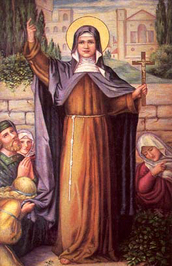
Pope Innocent IV ascended the Papal Throne on June 15, 1243. Frederick offered some concessions, but it was clear that he was bent on having the Papal States. The Pope secretly left Rome, arrived at Lyons on December 2, 1244, and early in 1245 summoned the Bishops and princes to a Council there. The First Council of Lyons opened on June 28, but waited for the absent Frederick for three weeks. When he still failed to arrive, the Council passed sentence of excommunication, and the Pope declared Frederick deposed of his imperial authority. This caused great turmoil in Germany, as the clergy generally supported the Pope, but the nobility generally supported Frederick (thus helping to set the stage for the Protestant revolution centuries later). Meanwhile in Italy, Frederick continued to gain control over Papal territory.
Viterbo, too, fell to the imperial power (the Ghibellines); but here, in a sickly little girl, the mighty Frederic would find one of his greatest foes. To defend the Church's rights was her burning wish, and for this she received her mission from the Mother of God. After restoring her health, Our Lady gave Rose the Franciscan habit, with the command to enroll herself in the Third Order of St. Francis and then to go forth and admonish her native town. When hardly twelve years old, Rose went down to the public square at Viterbo, called upon the inhabitants to be faithful to the Sovereign Pontiff, and vehemently denounced all his opponents. So great was the power of her word, and of the miracles which accompanied it, that the Ghibellines, in fear and anger, drove her from the city in January, 1250. Rose and her parents took refuge in Sorriano. On December 5, 1250, Rose foretold the speedy death of the emperor, a prophecy realized on December 13. Soon afterwards she went to Vitorchiano, whose inhabitants had been perverted by a famous sorceress. Rose secured the conversion of all, even of the sorceress, by standing unscathed for three hours in the flames of a burning pyre, a miracle as striking as it is well attested.
Pope Innocent IV was brought back in triumph to Rome and the cause of God was won. With the restoration of the papal power in Viterbo (1251) Rose returned. She wished to enter the monastery of St. Mary of the Roses, but was refused because of her poverty. She humbly submitted, foretelling her admission to the monastery after her death. The remainder of her life was spent in the cell in her father's house, where she died in her eighteenth year. Not long after, she appeared in glory to Pope Alexander IV, and bade him translate her body. He found it as the vision had said, but fragrant and beautiful, as if still in life. Her feast is celebrated on Sept. 4th, when her incorrupt body is carried in procession through Viterbo.




